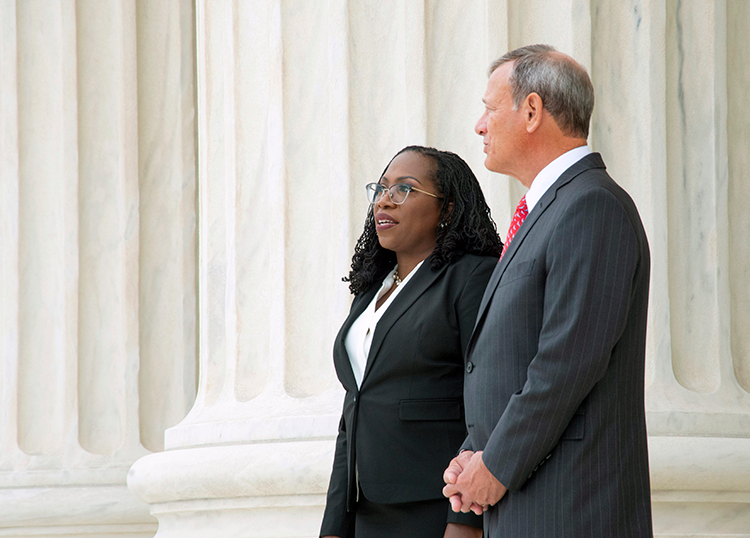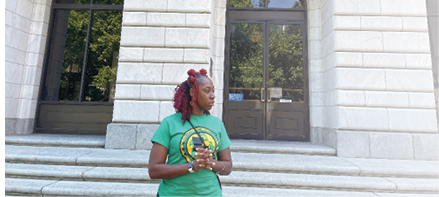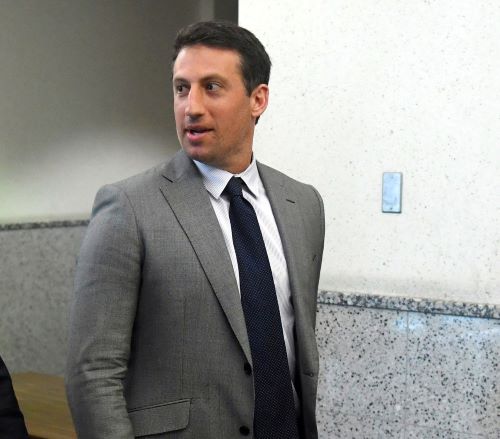Justice Jackson uses originalism to undercut ‘conservative juristocracy’
Legal Theory
Justice Jackson uses originalism to undercut ‘conservative juristocracy’
December 13, 2022, 8:59 am CST
Justice Ketanji Brown Jackson and Chief Justice John Roberts stand on the steps of the U.S. Supreme Court Building. (Photo by Collection of the Supreme Court of the United States via Getty Images)
U.S. Supreme Court Justice Ketanji Brown Jackson is the de facto leader of a group embracing “a third wave of progressive originalism,” according to Lawrence Solum, a professor at the University of Virginia School of Law.
In a guest post at the Balkinization blog, Solum argued that liberals should embrace Jackson’s originalism, rather than living constitutionalism. Conservatives have embraced the latter theory in the past to achieve their ends, Solum said, just as they are now using originalism.
“If conservative judges are making selective use of history to make originalist arguments for conservative results, then the only way to show this is to make better originalist arguments to the contrary,” Solum wrote.
Jackson used an originalist argument to oppose a conservative claim during during Oct. 4 oral arguments in a voting-map case.
The state of Alabama was arguing that a section of the Voting Rights Act violates the Constitution’s guarantee of equal protection for everyone.
“I don’t think we can assume that, just because race is taken into account, that that necessarily creates an equal protection problem,” Jackson said. “Because I understood that we looked at the history and traditions of the Constitution, at what the framers and the founders thought about. … It became clear to me that the framers themselves adopted the equal protection clause, the 14th Amendment, the 15th Amendment, in a race-conscious way.”
Solum said Jackson knows the most effective way to oppose conservative originalism is to expose the gap between outcomes preferred by conservatives and the original public meaning of the Constitution.
“Justice Jackson sees the obvious: Progressives must oppose a conservative juristocracy,” Solum wrote.
Solum said the first wave of progressive originalism was led by abolitionist Frederick Douglass, who argued that the public meaning of constitutional text, rather than racist intentions of its founders, is the binding source of constitutional law. That view “was enshrined” in the Reconstruction Amendments, Solum said.
The second wave of progressive originalism was a reaction to the Lochner era in which the Supreme Court struck down protections for workers using a theory of substantive due process in Lochner v. New York. Justice Hugo Black led this second wave, Solum wrote.
The New York Times noted Jackson’s comments and highlighted comments on originalism by another liberal justice, Justice Elena Kagan.
During her confirmation hearings, Kagan said in a sense, we are all originalists. She elaborated in a September interview at the Northwestern University Pritzker School of Law.
Kagan said some specific provisions of the Constitution need no interpretation, such as the requirement that presidents be at least 35 years old. Other provisions are written in broad and vague terms, and the framers of the Constitution had some understanding that the principles had to be applied to circumstances they couldn’t imagine, Kagan said.
The framers “knew that they were writing for the ages,” Kagan said.
Hat tip to How Appealing.
See also:
ABAJournal.com: Chemerinsky: “Originalism has taken over the Supreme Court”






